The Best Berries For Your Health, Ranked
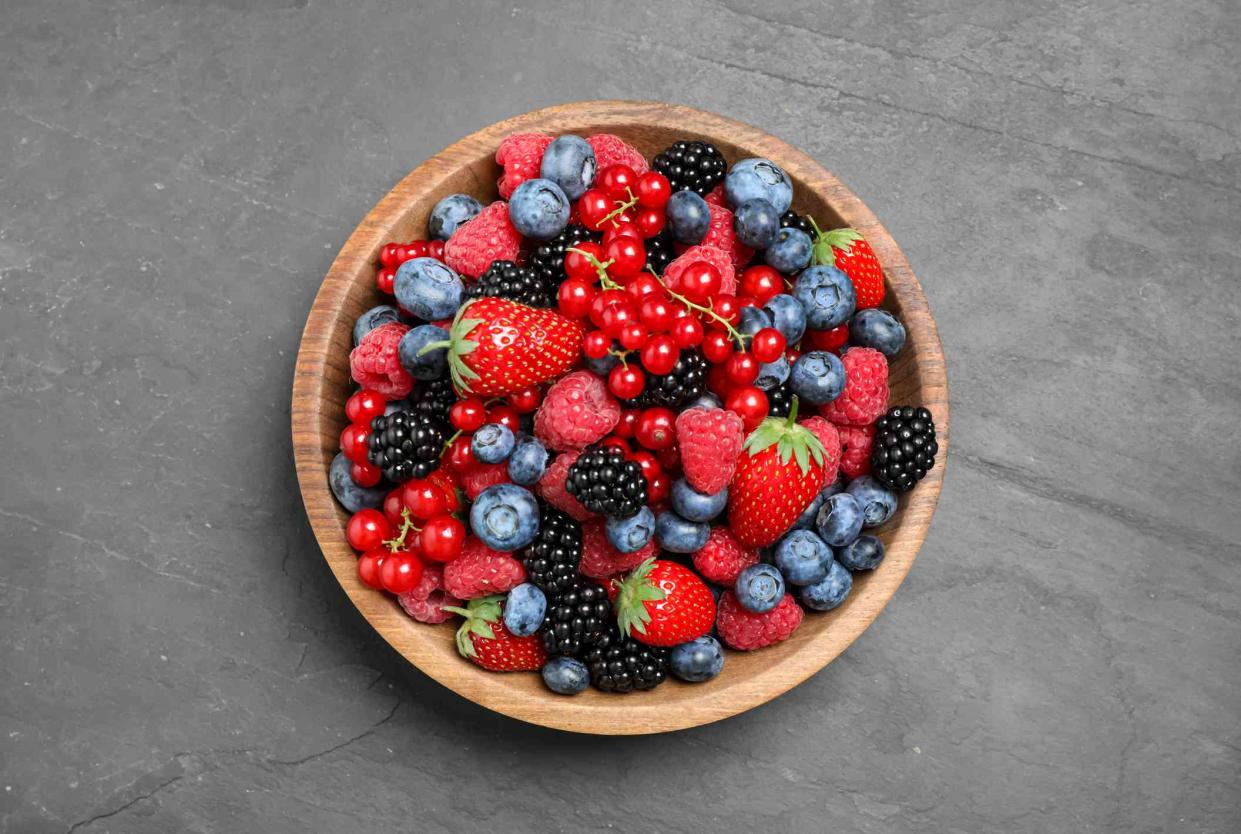
Liudmila Chernetska / Getty Images
Medically reviewed by Kierra Brown, RD
While all berries deserve a spot on your plate for their health benefits, some berries stand out like tiny champions, boasting high doses of vitamins, fiber, and antioxidants.
Berries are like super-charged shields that protect your cells from damage. They have four times the strength of other fruits and ten times the power of vegetables, thanks to their high antioxidant content.
Keep reading for a ranking of the best berries, from everyday mainstays like strawberries to more exotic berries like goji berries. Prepare to navigate the berry bounty and discover how to add these fruits to your diet.
1. Blueberries
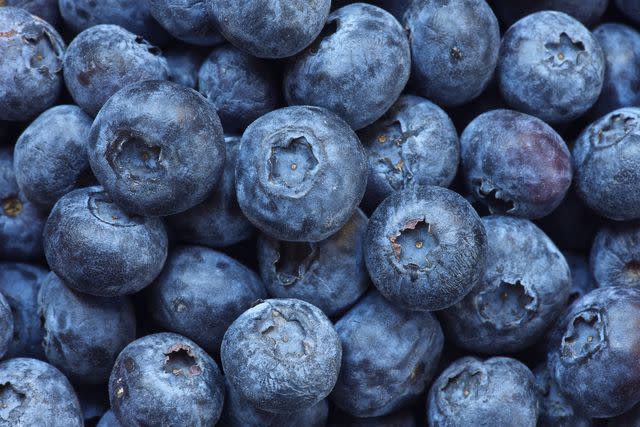
Ross Woodhall / Getty Images
Blueberries contain high amounts of anthocyanins and other good-for-you plant compounds. Anthocyanins are natural plant pigments that give fruits and vegetables their vibrant colors. These compounds protect your cells, calm things down when inflamed, and even fight off harmful germs.
Studies show that eating blueberries regularly can offer numerous benefits like keeping your heart strong, preventing type 2 diabetes, and even helping your brain stay sharp. Plus, they can make it easier to maintain your weight and may protect your eyesight from an eye disease called macular degeneration.
Blueberries are rich in vitamin K, with a 1-cup serving meeting 23% of the recommended intake or daily value (DV). Vitamin K is important for bone health and blood clotting. Additionally, blueberries are also high in manganese, delivering 22% of the DV in a 1-cup serving. Manganese is a mineral involved in energy production and protecting the cells from damage. It's also needed for bone, immune, and reproductive health and blood clotting.
Blueberries may be one of the most studied berries, but that doesn't mean the others aren't as healthy. Think of berries as a team, all with a role to play in your health.
2. Blackberries
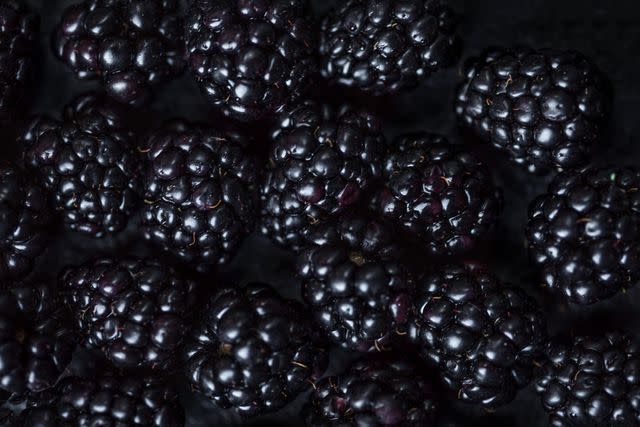
Zakharova_Natalia / Getty Images
Blackberries boast high amounts of anthocyanins and other polyphenols (beneficial plant compounds).
Among berries, blackberries rank high in delivering fiber, a nutrient many people are lacking in. A 1-cup serving delivers 7.63 grams (g) of fiber (27% of the DV). Fiber helps you feel fuller for longer, supports gut health, and can help with weight management and blood sugar control.
Blackberries boast high amounts of manganese (40% of the DV), vitamin C (34% of the DV), and vitamin K (24% of the DV). They're a good source of copper (18% of the DV), a mineral that supports the immune system and is needed to make energy, connective tissues, and blood vessels.
3. Raspberries
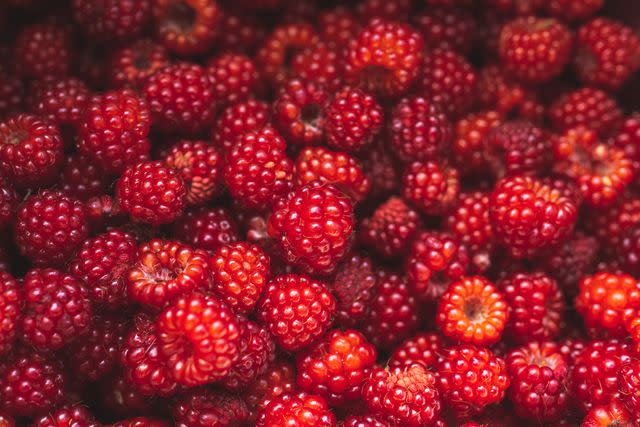
Jena Ardell / Getty Images
The antioxidant power of raspberries is due to their high amounts of anthocyanin and ellagitannins (another plant compound). Black raspberries are especially rich in these health-boosting compounds. Research indicates that consuming foods rich in anthocyanins and ellagitannins may help in reducing cholesterol levels, waist circumference, blood pressure, and blood sugar levels.
Raspberries supply high amounts of vitamin C (36% of the DV ), manganese (35% of the DV), and an impressive 8 g of fiber (29% of the DV) in a 1-cup serving. They're also a good source of copper (12% of the DV).
4. Strawberries
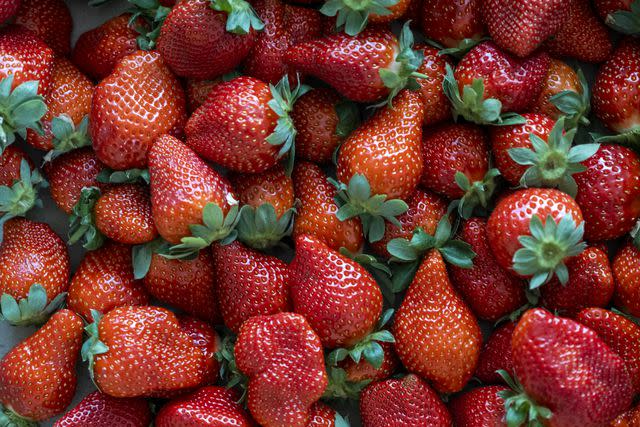
Ivan / Getty Images
One cup of whole strawberries provides 94% of the DV for vitamin C. Vitamin C is known for its antioxidant properties and its role in supporting immune health. It's also essential for making collagen, a protein necessary for proper wound healing. Additionally, vitamin C helps the body absorb iron from plant-based foods.
Strawberries are high in manganese (24% of the DV) and are a good source of folate, meeting 8.7% of the DV in a 1-cup serving. Folate is essential for the production of DNA and other genetic materials, making it especially important for a healthy pregnancy.
Research shows eating strawberries regularly can offer several benefits. They've been linked to improved vascular (blood vessels) health, blood pressure, and cholesterol. Eating strawberries can also help with insulin resistance, a condition in which the body isn't responding normally to insulin, the hormone the body makes to maintain normal blood sugar levels.
5. Blackcurrants
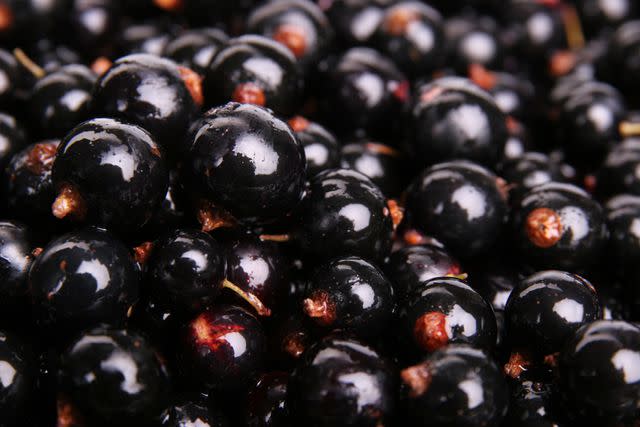
w-ings / Getty Images
Blackcurrants are packed with antioxidants and nutrients, despite being less popular than other berries. One cup of blackcurrants contains 203 milligrams (mg) of vitamin C, which is 226% of the recommended daily value, more than the amount found in strawberries.
Blackcurrants contain high levels of proanthocyanidins, which have various health benefits, such as reducing inflammation, fighting germs, and helping blood vessels relax.
One cup of blackcurrants delivers 12% of the DV for manganese and 8% of the DV for potassium. Potassium supports many bodily functions including kidney, muscle, heart, and nerve health.
Blackcurrants are also a good source of copper (11% of the DV) and iron (10% of the DV). Iron is necessary for making red blood cells and certain hormones.
6. Goji Berries
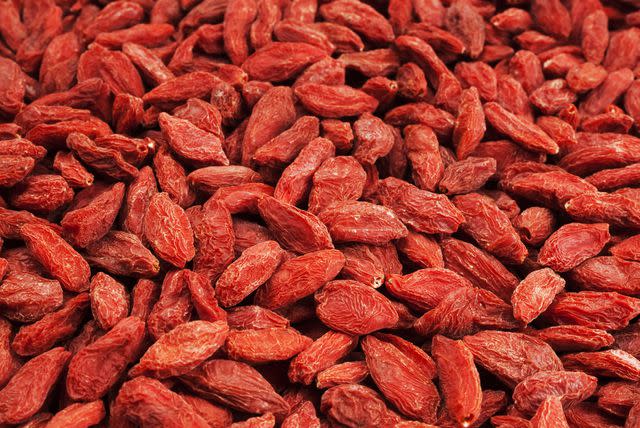
ulkan / Getty Images
Goji berries or wolfberries are small red berries that have been used in traditional Chinese medicine for over 2,000 years. They've been used in herbal medicine to improve vision and support the kidneys and liver. Goji berries are typically sold dried in the U.S. and can be found in the dried fruit aisle or supplement section of grocery stores.
Among known dietary sources, goji berries contain the highest amount of zeaxanthin, a carotenoid (type natural pigment) found in red, yellow, and orange fruits and vegetables. Zeaxanthin is also found in the eye, serving as a protective shield against the effects of harmful light and oxidation and reducing the risk of age-related macular degeneration.
Research on goji berries is still in the early stages, but studies show they may provide some benefits including protecting against glaucoma (an eye disease) and diabetes.
A 5-tablespoon serving of dried goji berries offers 3.64 g of fiber (13% of the DV), 15% of the DV for vitamin C, and a hefty vitamin A dose (250% of the DV). The high vitamin A in goji berries is due to their carotenoid content. Vitamin A maintains the health of the eyes, immune system, heart, lungs, and other organs.
7. Grapes
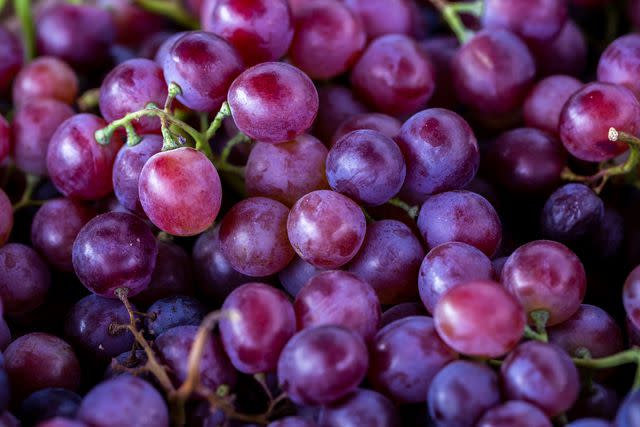
HUIZENG HU / Getty Images
Grapes are botanically a berry, of genus Vitis and family Vitaceae. They contain high levels of resveratrol, a beneficial compound in other plant foods like blueberries and nuts as well as red wine.
The health benefits of grapes are believed to be attributed to resveratrol, which has been shown to have antioxidant and anti-inflammatory actions and strengthen the immune system. It even helps manage heart disease, some cancers, and weight.
One cup of grapes provides 26% of the DV for manganese and 11% of the DV for vitamin K.
8. Cranberries
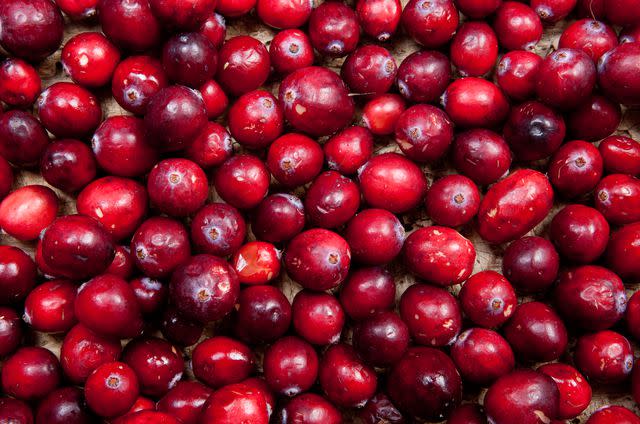
Studio-Annika / Getty Images
Although raw cranberries are safe to eat, their intense tartness can be off-putting to many people. In the U.S., cranberries are typically enjoyed as a juice, dried fruit, or as a sauce to serve alongside turkey. Nonetheless, cranberries (and cranberry products) are one of the most studied berries due to their rich polyphenol content and impact on human health.
Cranberry's antibacterial properties have been proven to help treat bladder and urinary tract infections. Cranberry consumption is linked to a lower risk of diabetes and cardiovascular and kidney diseases. Additionally, other studies show that cranberries can help with managing rheumatoid arthritis, preventing dental diseases, and improving the gut microbiota (the system of microorganisms living in the gut).
One cup of unsweetened cranberry juice provides 26% of the DV for vitamin C and 11% of the DV for vitamin K.
9. Acai Berries
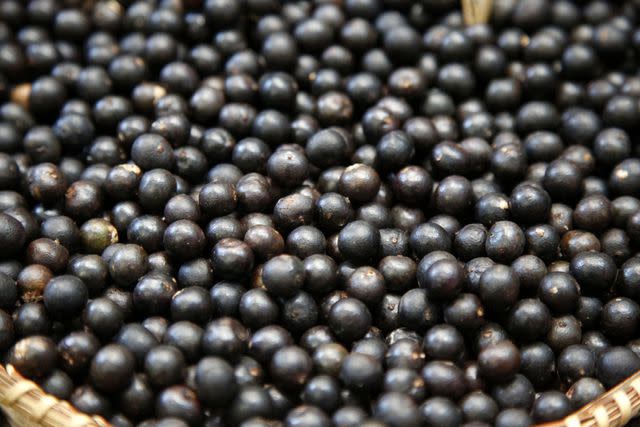
Ricardo Lima / Getty Images
Acai berries come from the acai palm, a plant that's native to tropical Central and South America. Numerous beneficial plant compounds are found throughout the plant's leaf, pulp, skin, fruit, and seeds.
You won't find fresh acai berries in the U.S. due to their short shelf-life and distance from their native habitat. Usually, acai is available in frozen form, as a part of frozen fruit smoothie blends for example, in powder form, or juice.
Some small human studies on acai product consumption show beneficial effects on HDL "good" cholesterol, vascular function, tinnitus (ringing in the ears), and blood sugars.
The U.S. Department of Agriculture's nutrition database lists acai in several branded food products. A non-branded listing of acai berry drink shows that an 8-ounce serving provides 3.19 grams of fiber (11% of the DV), 124% of the DV for vitamin C, 143% of the DV for vitamin A, 37% of the DV for vitamin K, and 197% of vitamin E, among other nutrients.
It's crucial to read the nutrition facts of all food products, including acai products, and to take note of any added sugars.
How to Include Berries In Your Diet
Remember, variety is key to a healthy diet, so mix and match these ideas to enjoy all the health benefits and deliciousness that berries have to offer.
Here are some ways to include more berries in your diet:
Top your yogurt, oatmeal, or cereal with a handful of fresh blackberries.
Fold blueberries into a pancake or waffle batter.
Toss raspberries into leafy greens alongside feta cheese and nuts for a vibrant and nutritious salad.
Blend black currants or acai powder with milk and other fruits or veggies for a nutrient-rich smoothie.
Roast strawberries with balsamic vinegar and black pepper for a unique and sweet snack.
Combine chopped dried cranberries with red onion, jalapenos, cilantro, and lime juice for a vibrant and refreshing salsa.
Eat grapes alongside wholegrain crackers and cheese for a balanced, nutritious snack.
Stir goji berries into cooked rice or quinoa for a nutritious and flavorful side dish.
Mix your favorite berry with cottage cheese.
A Quick Review
No matter your taste preference, from sweet and juicy blueberries to tart and vibrant raspberries, every berry packs a powerful punch of nutrients just waiting to be enjoyed.
Every time you add nutrient-rich foods like berries to your diet, it's a step towards meeting your nutrient needs and boosting your overall health. So, grab a handful and savor the taste of well-being!
For more Health.com news, make sure to sign up for our newsletter!
Read the original article on Health.com.

